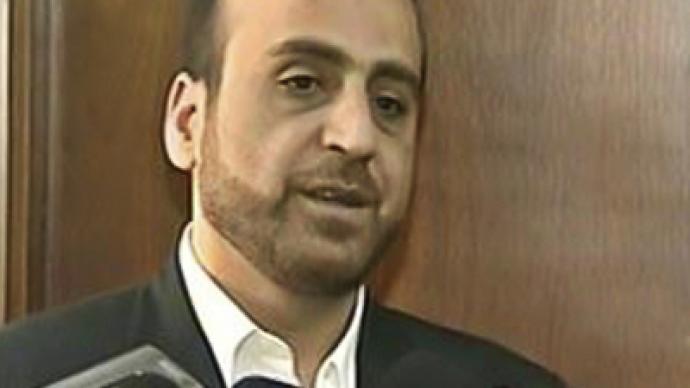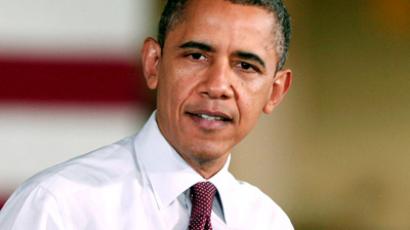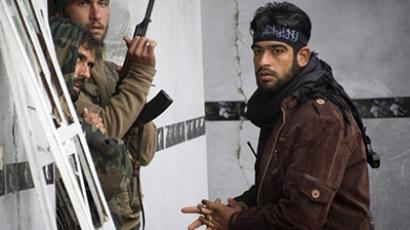Global powers will keep pouring oil on the fire in Syria - Hezbollah

There is no compromise on Syria alone – the entire Middle East is at stake and all the world powers have their interests there, Hezbollah’s Ammar Al-Mussawi told RT.
Ammar Al-Mussawi, the head of Hezbollah's International Relations shared his views on the grounds for the Syrian conflict and the possible ways to settle it in an interview with RT’s Nadezhda Kevorkova. Hezbollah believes the Syrian crisis is not a revolution but a case of international intervention and a way to punish Syria for its support of the Palestinians. Its leadership says the conflict has a political solution only, even while all its players want a bitter military escalation.RT: What is your assessment of the current situation in Syria?AM: What we are seeing is the escalation of foreign involvement and it’s hard to accept that it’s all being done to protect human rights and democracy. What they have in store for Syria could cause chaos across the Middle East. Different forces have drawn radicals and extremists into the fight, they have been supporting and exploiting them. They assure their nations that they are fighting against terrorists while here they are working hand in hand with terrorists. RT: What do you make of Russia’s stance on this difficult issue? AM: We believe that Russia has taken a responsible stance and is acting in line with international law. There’ve been attempts to distort Russia’s position and make it look like it is pursuing its own selfish ends in Syria. We’ve been watching the developments in Syria for two years now and what we see is that Russia has stayed true to the key principles it announced. The main one is non-interference. If those who promote the right to interfere get the upper hand, then they would be able to destroy any country and inflict pain on any nation. Russia was initially concerned with the escalation of violence. Now we see what this violence has led to. So Russia was right.RT: What is your forecast for the conflict in Syria?AM: The regime is still strong, but destructive consequences of the crisis have been felt throughout the country. We fear that violence can spill over beyond Syria. The longer the crisis, the more chaos we see, the more factors there are that make these clashes look legitimate. The conflict in Syria has gone beyond a simple domestic political dispute. You have the same tension in Lebanon, Iraq, Turkey, Jordan. The Gulf countries will not remain safe havens in case this conflict will spill over. As we see it, the West wants to keep the situation in Lebanon stable so far to keep the spotlight on Syria. But sooner or later, violence may sweep across Lebanon.Already today there are a total of 100,000 Syrian refugees in Lebabon and hundreds of rebels fighting for the Free Syrian Army. Some of them are armed, and the latest events in Tripoli prove my point. The Lebanese are divided over what’s happening in Syria. Some, like us, think it’s a conspiracy by the West that wants to intervene. Others believe it’s a revolution and their duty is to support it. RT: Do you think there is a potential solution?AM: We agree that the crisis cannot be resolved through force. A political solution is the only way forward. The communique adopted in Geneva was expected to become the platform for a transition period when such a solution could be found, no conditions are mentioned there. But the West said that Assad must go before it will be implemented. So at the moment we do not see any serious opportunities for a political solution.It was possible to turn the tide before the conference of the so-called Friends of Syria. Now they have a chance to achieve what they want through the use of force. Those who reject talks have only one goal in mind – they want the conflict that has brought death and destruction to continue. Those who have accused the regime of killing Syrians seem to forget that they are supporting rebel fighters and are only adding fuel to fire. That’s why we believe they want to destroy the Syrian society and rip the country apart. After that they will define new goals for new proxy players.RT: Why has Syria been chosen as a target? For many decades, Syria has been the only country in the region has played a positive role in the Palestinian issue. That’s why the West wants to remove Syria. The oil and gas deposits found in the Eastern Mediterranean are a factor, too. The one who wins in Syria will get the right to develop them. Also, Qatar, which is small in territory and population, is seeking to play a big role in the region. They want to supply gas to Europe, and Syria will allow them to do this if the current regime is crushed.Any sane person understands that Russia doesn’t have imperialistic ambitions like some others. As far as relations with Russia are concerned, you don’t have to say ‘no’ to your own interests, you don’t have to sacrifice your own country. Some say that Russia will start losing its influence and popularity. But these people are Americanized Arabs, who cannot speak for the whole Arab world. If we held a referendum among Arabs right now and asked them to express their opinion of Russia, I can promise you – over 50% would give Russia their approval, US policies lead to destruction. Some Western ambassadors have been using Tunisia, Egypt, and Libya as examples of democratic changes. But what’s happening in those countries is not a good example, this is the worst scenario possible. So we don’t have a choice – we need to stay strong and resist.RT:What do you think of the March 14 alliance in Lebanon?AM: This organization hopes that the Syrian regime will be overthrown. In that case they will take power in Lebanon. They consider Hezbollah, General Michel Aoun and the Amal Movement to be the echo of the situation in Syria. Their problem is that they cannot fulfill their mission, but keep giving empty promises to their partners. For the sake of argument let’s say the regime in Syria falls (which is impossible), wouldn’t it be replaced by another regime? This is not realistic. If the fist that keeps everything together loosens its grip, there will be chaos in all countries and Syria will fall apart. Syria will have to deal with serious problems for many years to come. The March 14 alliance will not be able to implement its political projects in Syria. Hezbollah is not an anti-March 14 alliance force. Our allies have enough power to keep the balance of forces inside Lebanon. Hezbollah is an anti-Israel force, it is not our objective to stand against the March 14 alliance.RT:Some experts say that Israel wants Assad to stay in power, others think that chaos in the country would benefit the Israelis. What do you think?AM: What is happening in Syria benefits Israel, because they hope that Syria is getting weaker. Let’s have a closer look at the situation. In the past years, President Assad has proven to be a strong supporter of Lebanese and Palestinian anti-Israel forces. Israelis like to say, “Better the devil you know than the devil you don’t know.” Now they are saying that what happens after this regime falls, will be more acceptable than Assad staying in power.Israel openly admits that it wants the Syrian regime to fall, and they even give exact dates when it is going to happen. There was a scandal involving Israeli intelligence. They want a weak country with weak leadership, focused on domestic problems. And if this new power decided to fire a few rockets at the Golan Heights from Katyusha launchers – that’s a price Israel is willing to pay. Israel views the Syrian regime as the link connecting Palestinian and Lebanese anti-Israel forces and their supporters in Iran. The frontline that runs from Iran to Gaza through Baghdad, Damascus, and Beirut, poses a challenge to American interests and Israeli domination in the region.The latest events in Gaza confirm it. It was not easy to launch rockets into Tel-Aviv. Throughout the whole history of Israel, Tel-Aviv was one of the most secure cities. Now Fajr-5 rockets can reach Tel-Aviv, and these rockets are not small. Such threats define Israel’s approach to Syria. They consider Assad part of the anti-Israel strategy. After the Camp David Accords, the Syrian and Iraqi armies were the only two forces in the region not equipped by the US. Americans didn’t control these two armies. They were equipped and trained by the Soviet Union. In 2003, the US managed to destroy Iraq’s forces. Now they intend to do the same in Syria. RT: There are about half a million Palestinian refugees in Syria. Do you know anything about their involvement in the conflict?AM: We don’t have much information about it. But many Syrians support the Palestinians and their cause. As for the Palestinian refugees – out of all Arab countries, including Lebanon, Syria offers them the best conditions. Syria has always supported the Palestinian cause at all political platforms and on the international arena. They have always kept their doors open for all Palestinian political movements, even when other countries, including the ones in the Arab world, closed theirs. So it wouldn’t be right for Palestinians to take Syria’s support for granted. So we hope that Palestinians will not take sides in the Syrian conflict. But we also know of cases when external forces turned Palestinians against Syria. The recent events in the Yarmouk camp near Damascus is one of them. If you know the area, you will understand how the armed rebels were able to penetrate and bomb it. But leaders of different Palestinian movements are being wise and making sure that Palestinians do not get involved in this conflict. RT: Can the Syrian crisis be resolved through force?AM: This problem can only be solved through political means. But when you have armed groups and they are supplied with weapons from the outside, the regime has no other choice but to fight back. The West is distancing itself from explosions and terrorist attacks. This is dangerous. If you’ve chosen to keep them, then don’t blame anyone but yourself when these blasts start happening in your country. Those who are trying to rationalize terrorism shouldn’t be surprised if the terror strikes back at them. Syria must take a firm stand against terrorism and all its allies should be on its side. We are not just dealing with hooligans and a few armed guys. This is a war against an international coalition. We have to seek all the means possible to make sure the current Syrian regime stays.RT: Your party runs many hospitals and charities that take care of the handicapped. Can you tell us more about it?AM: Hezbollah was founded in 1982, after the Israeli aggression, and we didn’t participate in the civil war. We enjoyed a broad grassroots support. We don’t barter – you give us support, and we will give you aid. We are just trying to help people where the state is not able to.We started out by simply supporting people and families in need. And then we put our work on a regular and large-scale level. We set up infirmaries, hospitals, centers for underprivileged families, families of those who were killed, special schools and centers for war veterans.We’re not saying that we have got it 100% covered or that all of our people’s needs are taken care of. Our facility for the handicapped was completely destroyed by Israel during the war in 2006, and we have only recently managed to re-build it. We extend help to all confessions and all social groups including our Palestinian brothers.Today, we’re working hard to help Syrian refugees, and we are helping all of them, not only those who support President Assad. We are helping everyone regardless of their political views. You always have to put a human attitude above politics. We have accommodated some wounded Syrians from the opposition in our hospitals. They are no longer taking part in combat operations and must be treated humanely and provided with medical care.We know that 11 Lebanese nationals are being held as POWs in Syria. They are not members of Hezbollah but we share similar views. We could easily apprehend and turn to POW status over 500 people from the so-called Free Syrian Army in order to liberate those 11 Lebanese nationals in a swap. But we choose not to use such methods. It’s a matter of principle.RT: How do you think the situation will unfold?AM: If you want to know my personal view, I feel that this war in Syria is going to last for quite a while.We’ve already discussed the factors driving this crisis, but there’re much deeper causes behind it. The whole world is fighting in Syria, it seems, with all the countries having their interests in the conflict. Politics and oil are very much connected, tensions are high, and all the stakeholders are interested in further escalation.There’s only thing that the parties to the conflict have so far succeeded in achieving: they have defined some rules of their involvement and drew the red lines which they think they are not going cross.The world powers are not willing to get fully involved in the situation. No one wants to do that, neither Americans, nor the French, nor Turkey, nor Iran. They are all involved in the conflict but they don’t want to battle it out on the ground. Therefore, they are all going to keep pouring oil on that fire. I do not see there is a solution. But I very much hope I’m wrong about it. I don’t think that any party would agree to be the losing side. And even if we talk about a compromise, we all understand that such a compromise will have to be reached on so much more than just Syria. It will be about the entire Middle East and all the world powers. Working out a compromise is a very challenging and complicated task. Each of the parties will keep score of possible benefits they can obtain and threats they will run, so it is a very complex equation. This is a conflict with a very deep hidden agenda and so far it has not exhausted itself.
Nadezhda Kevorkova, RT, Beirut














